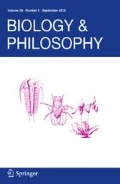Abstract
The leading Intelligent Design theorist William Dembski (Rowman & Littlefield, Lanham MD, 2002) argued that the first No Free Lunch theorem, first formulated by Wolpert and Macready (IEEE Trans Evol Comput 1: 67–82, 1997), renders Darwinian evolution impossible. In response, Dembski’s critics pointed out that the theorem is irrelevant to biological evolution. Meester (Biol Phil 24: 461–472, 2009) agrees with this conclusion, but still thinks that the theorem does apply to simulations of evolutionary processes. According to Meester, the theorem shows that simulations of Darwinian evolution, as these are typically set in advance by the programmer, are teleological and therefore non-Darwinian. Therefore, Meester argues, they are useless in showing how complex adaptations arise in the universe. Meester uses the term “teleological” inconsistently, however, and we argue that, no matter how we interpret the term, a Darwinian algorithm does not become non-Darwinian by simulation. We show that the NFL theorem is entirely irrelevant to this argument, and conclude that it does not pose a threat to the relevance of simulations of biological evolution.
Notes
Meester is not an ID proponent as such, because he refuses to infer the existence of a designer. However, he does think that ID, and the concept of irreducible complexity in particular, “poses a serious problem to a Darwinist scenario” (Meester 2003, p. 152). And he claims that “at some points, the ID movement does an excellent job, and on those points I have defended it. In particular, it successfully attacks the popular idea that evolutionary biology only needs to fill in some small gaps.” (Meester 2006, p. 296).
References
Dawkins R (1986) The blind watchmaker. Longman Scientific & Technical, Harlow
Dembski WA (2002) No free lunch: why specified complexity cannot be purchased without intelligence. Rowman & Littlefield, Lanham MD
Dennett DC (1995) Darwin’s dangerous idea. Penguin, London
Häggström O (2007a) Intelligent design and the NFL theorems. Biol Philos 22:217–230
Häggström O (2007b) Uniform distribution is a model assumption. Available from http://www.cs.chalmers.se/~olleh/reply_to_Dembski.pdf. Accessed on 3 Oct 2009
Lenski RE, Ofria C, Pennock RT, Adami C (2003) The evolutionary origin of complex features. Nature 423:139–144
Meester R (2003) Het pseudoniem van God. Een wiskundige over geloof, wetenschap en toeval (A pseudonym of God. A mathematician on religion science and chance). Ten Have, Baarn
Meester R (2006) Mijn God, ik weet niet wie Gij zijt, maar wel dat Gij niet zijt een god naar mensentrant (My Lord, I don’t know who Thou art, but I know that Thou art not a God after the image of man). In: Dekker C, Meester R, van Woudenberg R (eds) En God beschikte een worm. Over schepping en evolutie (And God prepared a worm. On creation and evolution). Ten Have, Kampen, pp 282–298
Meester R (2009) Simulation of biological evolution and the NFL theorems. Biol Philos 24:461–472
Orr HA (2002) Book review: no free lunch. Boston review (summer issue)
Perakh M (2002) A free lunch in a mousetrap. Available from http://www.talkreason.org/articles/dem_nfl.cfm. Accessed on 12 Sept 2009
Perakh M (2003) The no free lunch theorems and their application to evolutionary algorithms. Available from http://www.talkreason.org/articles/orr.cfm#1. Accessed on 12 Sept 2009
Perakh M (2004) There is a free lunch after all. William Dembski’s wrong answers to irrelevant questions. In: Young M, Edis T (eds) Why intelligent design fails: A scientific critique of the new creationism. Rutgers University Press, NJ, pp 153–171
Rosenhouse J (2002) Probability, optimization theory and evolution. Evolution 56(8):1721
Sarkar S (2007) Doubting Darwin? creationist designs on evolution. Blackwell, Cambridge
Shallit J (2002) Book review: no free lunch. Biosystems 66:93–99
Wein R (2002a) Not a free lunch but a box of chocolates: a critique of William Dembski’s book No free lunch. Available from http://www.talkorigins.org/design/faqs/nfl
Wein R (2002b) Response? What response? How Dembski has avoided addressing my arguments. Available from http://www.talkorigins.org/design/faqs/nfl/replynfl.html. Accessed on 15 Sept 2009
Wolpert DH (2002) William Dembski’s treatment of the no free lunch theorems is written in jello. Available from http://www.talkreason.org/articles/jello.cfm. Accessed on 15 Sept 2009
Wolpert DH, Macready WG (1997) No free lunch theorems for optimization. IEEE Trans Evol Comput 1:67–82
Acknowledgments
Stefaan Blancke’s research is supported by grant BOF08/24J/041 from Ghent University. Maarten Boudry is a doctoral fellow of FWO Flanders. The authors would like to thank Olle Häggström, Peter Olofsson, Mark Perakh and Kim Sterelny for their helpful remarks on earlier drafts of this paper.
Author information
Authors and Affiliations
Corresponding author
Rights and permissions
About this article
Cite this article
Blancke, S., Boudry, M. & Braeckman, J. Simulation of biological evolution under attack, but not really: a response to Meester. Biol Philos 26, 113–118 (2011). https://doi.org/10.1007/s10539-009-9192-8
Received:
Accepted:
Published:
Issue Date:
DOI: https://doi.org/10.1007/s10539-009-9192-8

